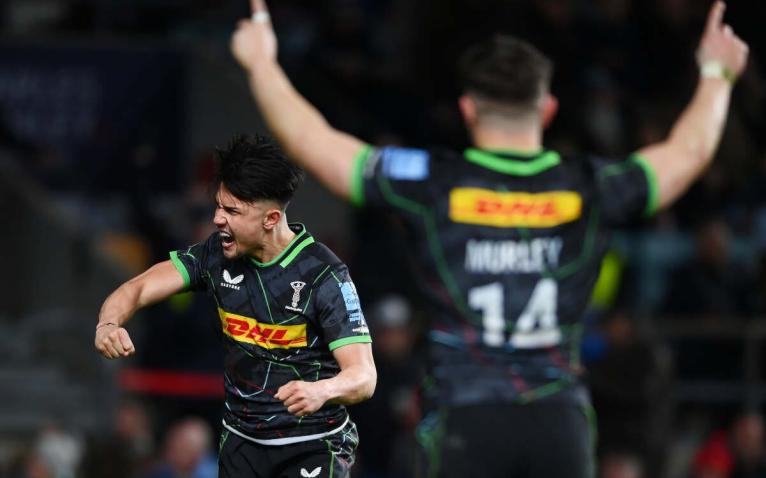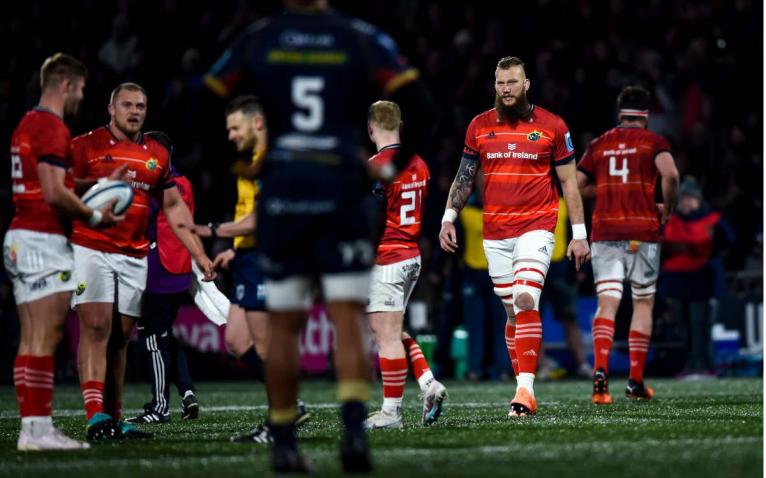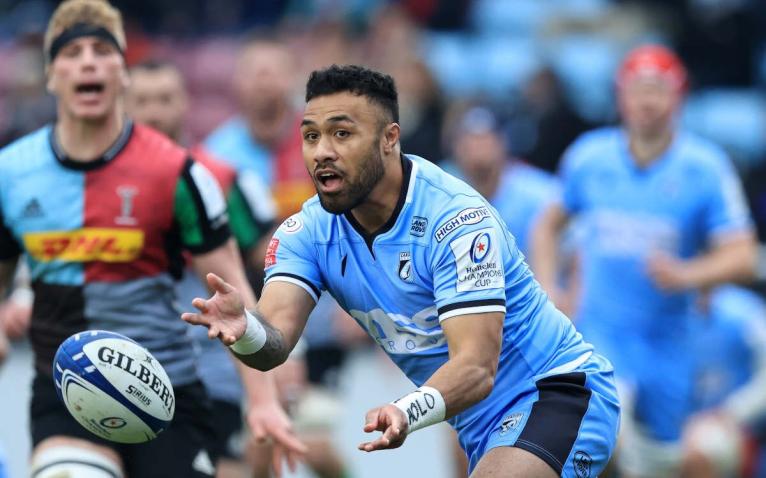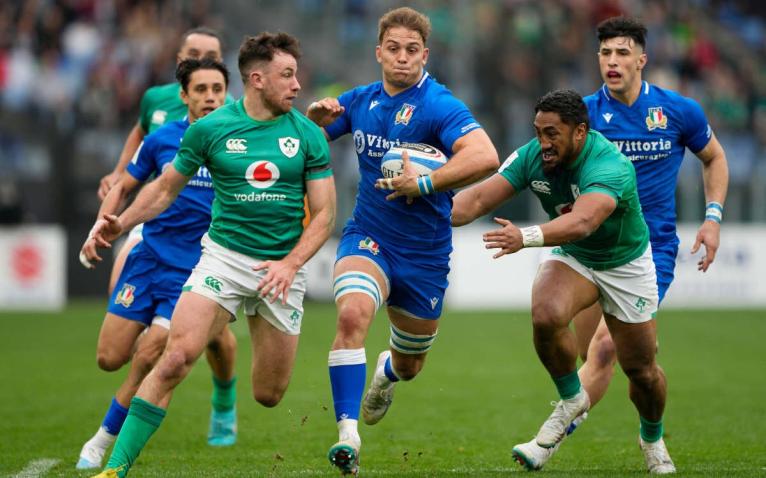While the next fortnight will be dominated by a Six Nations reaching its denouement, the business end of the domestic leagues gathers pace. Saracens and Sale Sharks are fighting it out at the top of the table, while Leicester are back in contention but it is the West Country entertainers, Bristol Bears, who forced the rugby world to sit up and take notice with their evisceration of Northampton Saints.
There was such for RugbyPass+ to discuss, after a weekend of drama…
Bristol return to the bear necessities
Up till early December, when they went toe-to-toe with Leicester Tigers, it had been a season of woe for Bristol Bears. Mostly lampooned at the foot of the Premiership, they were less than the sum of their expensively assembled parts. A dysfunctional unit that had forgotten how to win. The body language was questionable and many of their international players, like Callum Sheedy and Harry Randall, had fallen out of contention, due to form and injury. Unsurprisingly, there were murmurs of discontent in the ranks. There was even idle talk of Director of Rugby, Pat Lam position’s being under scrutiny.
Since then, however, there has been a significant turnround in results. They have won nine games in twelve, with losses only to London Irish, and league leaders Saracens, by a solitary point. The culmination to this upturn was a shellacking of high-flying Northampton Saints, 62-8. A rout, in which nine tries were scored and players like Randall and Charles Piutau, raised pulses with their innovation and enthusiasm to entertain. The two combined for one of the tries of the season in the first half and by the time Ioan Lloyd had raced over for his try-brace, a humbled Saints – shorn of five key players to the England training camp – were in tatters, with Phil Dowson describing it as a humbling experience, and calls for an instant reaction.
The performance at Ashton Gate was reminiscent of their buccaneering swagger displayed in the 2020-21 season before they were stunned by a Harlequins magic act in the Premiership semi-finals. Some have said they’ve never been the same since.
Now, however, opportunity knocks and there is talk of an unlikely assault on a Top 4 play-off place. With the likes of Fitz Harding and Ioan Lloyd and returning to their irrepressible best, and Semi Radradra fit, with Ellis Genge and Kyle Sinckler to return, optimism reigns where once a lack of belief dominated. Bristol Bears are back in business.
Marcus Smith shines – but will it matter?
If Steve Borthwick threw down a gauntlet to Marcus Smith, the little pivot has hungrily taken up the challenge. On Saturday, days after his omission from England’s fallow week training, Smith had Twickenham in the palm of his land. The maestro strutting around the gilded stage as Harlequins put Exeter to the sword.
It was another instalment in Smith’s spree of domestic masterclasses. Another addition to his glittering highlights reel in the famous quarters of his club.
We know Smith produces this kind of stuff for Quins. We know he can make the Premiership, a brutal, attritional and fiercely competitive league, look like child’s play. Sometimes we even take his generational brilliance for granted. Saturday’s near-flawless display of stepping, weaving, scoring and kicking, has almost become the norm.
But is such a performance, as stunning as it was in so many respects, going to compel Borthwick to pick Smith? Bluntly, will it really make a difference when Borthwick sits down to pick his team for Le Crunch?
England don’t play like Harlequins. They didn’t under Eddie Jones, and they aren’t in the early throes of Borthwick’s tenure. They don’t pick a midfield like Harlequins either, with a multi-faceted colossus, Andre Esterhuizen, and a rapid running threat, Joe Marchant. Owen Farrell is their captain so he will occupy jersey 10 or 12 and his combination with Smith feels like a forced attempt to shoehorn both men into the side.

England are in a building phase right now. Building confidence and building a style. They want Farrell on the pitch because of his clutch skill, leadership and unshakeable mentality. George Ford, fit again and recalled to the squad, has the coach’s unwavering trust. He delivered Borthwick’s blueprint beautifully to sweep Leicester to the Premiership crown.
Smith is better than squad fodder or an impact substitute. Slotting him next to Ollie Lawrence could be deadly. His long kicking game is far sharper than many give him credit for. At the moment, though, it is hard to see where he fits in an England XV.
Soon after his appointment, Borthwick stressed the importance of every minute of training time, given how little opportunity he would have to shape his players. Smith’s release did not suggest he would play much of a part against France. Despite lighting up Twickenham again, that is likely to remain the case.
Return of the hero
Imagine how it was to be RG Snyman. You are 6’9”, you are a World Cup winner, you are the signing everyone in Munster has been waiting for since Paul O’Connell retired five years earlier.
You don’t read every newspaper but you pick up on things. This club, this province, this fan base, they need you to be good because the only way their team will ever be a championship winning side again is if they have a big enforcer, a 6’9” brute, pushing and carrying and bullying his way past the opposition.
You feel this pressure as you step out for your first game.
By now you know all about Leinster. Big city team. Well-heeled supporters. You know your lot are different. Provincial, forgotten about, proud.
You know you want to deliver for this lot. You are seven minutes into your Munster career when you leap into the air to claim a lineout. You land awkwardly and you know there is trouble. Your cruciate has gone and so has your season.
You must feel an element of guilt because you are receiving this fabulous wage and you aren’t able to repay it. All you can do is sit there and recover. Surgery comes, then rehab.
If November is bad, December is worse, Christmas on your own, while your team mates prepare for a Boxing Day game.
Slowly the knee gets better. So does the mood. You contemplate a comeback but you are told to wait. Eventually, over a year after the injury, you get to play again. The roar you hear that night from the Limerick voices when you come as a replacement, it fills you with pride. You can’t wait to go again.
You land in this town called Llanelli. You count the ls in the name. You try and pronounce it and your team mates laugh at your attempt to perfect the rolling vowels and the soft consonants. You get back on the pitch. You are feeling good for 10 minutes … and then your knee goes again.

More pain. More surgery. More weeks and months on your own. More time on the gym bike. More games watched from the stands or the sofa. In all you have played 54 minutes while all this money keeps coming into your bank account.
Your contract runs out. You have a chance to leave and receive copious amounts of money in a different city, a different country. But something makes you stay. The South African friends you had here, CJ Stander, Damien de Allende, Jason Jenkins, have either moved on or moved home.
But you stay. It’s less money than what you were offered elsewhere. But you stay. The season starts without you. Christmas comes and goes without you. So does January, and February.
But you are getting closer. You sense something coming. Then awful news hits. Tom Tierney and Brian O’Brien, two deeply popular men and former players, pass away.
You sense the sadness. You can feel the emotion. Amid all this you get told you will be coming back.
No19, the shirt will be yours. By now it is Friday night in Cork.
You pull the shirt over your head and you remember the first game you played.
This is better than that.
You are 28 years old and you haven’t played since October 2021. That ended in pain.
You think you have been forgotten about but when a board with red neon letters goes up after 63 minutes and number 19 flashes up on it, you hear this roar. You look around the stands and the terraces, you are told there are 8,008 people there to see you run back onto the field. The roar gets louder, louder and louder with every step you take onto the pitch because these people, they appreciate loyalty. They treat you as one of their own.
And on Friday night, you feel better than you’ve ever felt, because two and a half years after you first came to this new country, you finally feel like you’ve arrived. And it’s the best feeling you’ll ever get as a player.
Welsh player exodus lays bare broken business model
While the WRU steadies itself to send a squad to Rome, and battle to avoid the dreaded Wooden Spoon, at home, the fires still burn.
It’s early March and the six-year heads of agreement document has still not been signed, three months after a verbal agreement was announced, and the trickle of Welsh players leaving Wales is in danger of turning into a torrent.
Already Will Rowlands (Racing 92) and Max Llewellyn (Gloucester) have signed deals out of Wales, putting in jeopardy their chances of representing Wales at the World Cup, but seasoned internationals Josh Adams, Liam Williams and Ross Moriarty are said to be close to heading to France and Japan amid the uncertainty. Another gifted player, Jarrod Evans, is reported to be on the verge of signing for Harlequins, as competition for England fly-half Marcus Smith.
These are your headline departures, likely to sign palatable contracts, but lurking below, are the regional players who have turned out, week-in, week-out for their team-mates who are facing an uncertain future. One such player who put the despair into words was the luckless Wales international, Willis Halaholo, who has used Twitter to express his dismay at his current situation. It felt raw. It felt unfiltered and it was very relatable to rugby fans enduring their own cost-of-living crisis. After picked up an Achilles injury in the training session before his comeback game, Halaholo said the contract offers on the table were so modest he couldn’t afford to pay for food for his children and that he was in a ‘dark place’, even though his coach, Dai Young wanted to keep him. This is simply unacceptable, and Halaholo is just one of the few players to go public with his frustrations because there are tens more players in exactly the same situation.

Jockeying their agents and praying they don’t get injured is now seen as the norm, as they desperately search for new clubs with which to carry on playing the game they love. There are no qualms about rugby’s necessity to cut its cloth accordingly but for the players to be pawns in a flawed strategy from the custodians of our game is inexcusable, especially given Steve Phillips, the former CEO of the Welsh Rugby Union, had asked them to ‘stick with us’ in the search for a resolution.
Indeed, most clubs in France and England have done their recruitment so there is a paucity of openings, leaving many contemplating leaving the game for good. This sorry situation should have been handled far better and quicker, but the breakdown in relations between the WRU and the regions must be seen as a failure. How Welsh rugby learns from its crisis will go some way into deciding its future, and at the moment, there doesn’t seem to be any individuals taking accountability for the sorry mess.
A proud rugby nation needs leadership and vision, and it needs to deliver it sooner, rather than later.
Live and let Dai
Last summer, Dai Flanagan signed up to become the Dragons head coach. He thought he’d be focusing chiefly on training, tactics and matches, easing into his first experience of the top job. Dean Ryan would take care of the managerial stuff leaving Flanagan to handle everything on-field.
Nine months on, Flanagan is part-coach, part-director of rugby, part-counsellor, part-spokesman. Ryan made a muted and rancorous early-season exit. Welsh rugby erupted into chaos, strife and anxiety. The regions waited an age for their budgets to be set and when the WRU finally firmed up the figures, the pool of money was more of a puddle.
Flanagan has not so much learned the ropes as found himself dangling from them. The Dragons are the poorest resourced team in Wales with the fewest men in Warren Gatland’s squad and a barren domestic record. Last season, they failed to win a single home game. They have won once since late October and sit second bottom of the URC, 11 points above perennial basement dwellers, Zebre Parma.
Operating in such grim circumstances, with so many constraints, Flanagan has conducted himself impressively. He has had to “fight the fight” for his out-of-contract players, taking him away from the training paddock and requiring academy coaches to step up and help. Around 20 players are out of contract this summer and a dozen have been offered new deals. Pay cuts will be commonplace. Some members of the congested middle tier, neither international talent nor up-and-coming youth, will be squeezed out of the picture entirely. Flanagan has handled the media fallout admirably and seems trusted by his charges.
Against this backdrop, the Dragons spirit is undimmed. They were down to 14, then 13 men against in-form Connacht on Saturday night, and should have won a see-sawing tussle at the end. They have a modest but dedicated following. A little over 5,000 fetched up at Rodney Parade to watch that last home game of the season. A lot of rugby teams are squished into not a lot of Welsh coast, but what might they get through the gates with a winning team, instead of one that has lost game after game, season after season?
In fact, the Dragons could emerge from this latest bout of Welsh upheaval the least disrupted. They aren’t paying exorbitant wages. None of their headline internationals are out of contract. They will not need to trim much fat simply because they don’t have fat to trim. Incredibly, their status in the national pecking order could actually rise. Flanagan, and the faithful followers of Gwent, deserve a break.
The Italian Job
It is 23 years since Italy entered the Six Nations but really it feels like they have only really arrived in the last 12 months.
Beating Wales was one thing, following that up with victories over Samoa and Australia another. They could have had a couple more scalps and would definitely have had one if Tommaso Allan’s 73rd minute penalty attempt in their opening fixture against France landed two inches to the left rather than the right of the posts.
So Italy lost that day, just as they did at Twickenham, just as they did nine days ago in Rome.
Yet they have won something bigger, everyone’s respect.
No longer is a game against Italy considered a gimme. A year ago they lost by 51 points to Ireland, this time it was 14. England’s winning margin 12 months ago was 33, this year it was 17, even though the venues switched from Rome for the larger defeat to Twickenham for the more recent tussle. France too had just five points to spare this time; 12 months earlier they had 17.
And it hardly takes a genius to figure out the difference, Kieran Crowley’s coaching yielding seven wins from 15 fixtures, which is remarkable when you consider his predecessor, Franco Smith, lost 13 from 13.

But it’s not just the individuals. Their patterns of play are more attractive and more effective than ever, while their goal-line defence against Ireland negated the most efficient finishers in European rugby. “A proper side,” noted Ireland coach, Andy Farrell, afterwards.
That’s the ultimate seal of approval. No team can take them lightly anymore, especially the Welsh who they play next, but also the Scots in round 5 and even France and New Zealand in this year’s World Cup. “They play from anywhere,” said James Ryan, Ireland’s captain, in the aftermath of Saturday’s 34-20 win. That makes a welcome change because for seven years they didn’t do much more than show up. That’s gone. This ‘proper’ rugby side can’t be overlooked anymore.





Comments
Join free and tell us what you really think!
Sign up for free